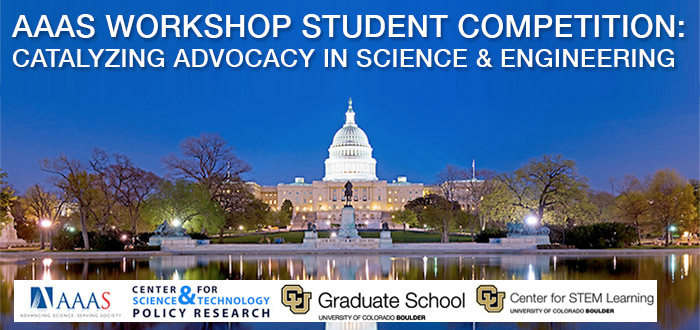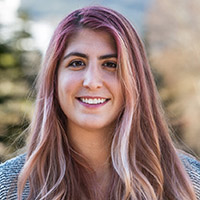
American Association for the Advancement of Science
"Catalyzing Advocacy in Science and Engineering" Workshop Student Competition
Student competition to attend the AAAS "Catalyzing Advocacy in Science and Engineering" workshop in Washington, DC to learn about Congress, the federal budget process, and effective science communication. Students will have an opportunity to meet with their Members of Congress or congressional staff.
 |
 |
 |
 |
 |
Due to the rapidly escalating health concerns relating to the spread of the coronavirus disease (COVID-19), the 2020 AAAS Catalyzing Advocacy in Science and Engineering (CASE) Workshop in Washington, DC, has been cancelled.
It is with deep regret that we share this information with you. We recognize the hard work that both students and sponsors have put into preparation for this spring’s workshop and do not take the decision to cancel the workshop lightly. AAAS’ decision to cancel this meeting was based on the latest reports from the Centers for Disease Control and Prevention (CDC) and the World Health Organization (WHO), the fact that a large number of attendees at this meeting are coming from affected U.S. states, and that an increasing number of institutions – including AAAS – have begun issuing guidelines and restrictions regarding university- or society-sponsored travel. Learn more ...
COMPETITION DETAILS
The CIRES Center for Science and Technology Policy Research is hosting a competition to send THREE CU Boulder students to Washington, DC to attend the AAAS "Catalyzing Advocacy in Science and Engineering" workshop. The competition is open to any full-time CU Boulder graduate student or upper class undergraduate in one of the following fields: Biological, physical, or earth sciences; Computational sciences and mathematics; Engineering disciplines; Medical and health sciences; and Social and behavioral sciences. The competition is supported by the CU Graduate School and the Center for STEM Learning. Competition winners will be asked to submit a brief report about their workshop experience and participate in a panel discussion in 2020.
WORKSHOP OVERVIEW
Making our CASE: Catalyzing Advocacy in Science and Engineering
March 29 - April 1, 2020
An exciting opportunity for upper-class undergraduate and graduate students in science, mathematics, and engineering disciplines to learn about science policy and advocacy. #MakingOurCASE
This entry-level program is organized to educate STEM students who are interested in learning about the role of science in policy-making, to introduce them to the federal policy-making process, and to empower them with ways to become a voice for basic research throughout their careers. The workshop is designed for students in science, technology, engineering, and math fields, with limited experience and knowledge of science policy and advocacy who want to learn more about science policy.
Students will participate in a three-and-a-half day program in Washington, DC. Participants will learn about the structure and organization of Congress, the federal budget and appropriations processes, and tools for effective science communication and civic engagement. In addition, students will participate in interactive seminars about policy-making and communication.
On the last day of the program, students will have the option to form teams and conduct meetings with their elected Members of Congress and congressional staff. More workshop Information.
2020 WINNERS
 |
Shirley Huang is a Ph.D. candidate in the Department of Speech, Language, and Hearing Sciences. Her research focuses on language development in bilingual children and emotional well-being in immigrant children from low socioeconomic backgrounds. As both a healthcare provider and a scientist, she is interested in learning how politics and policies impact culturally-linguistically diverse populations—populations that historically have been considered vulnerable. Shirley is passionate about advocacy work, and she applies her research to a larger scale in science, health, and educational policymaking. |
 |
Marielle Pellegrino is a fourth year PhD student in Aerospace Engineering. She is a Draper Fellow and Smead Scholar working in the Celestial and Spaceflight Mechanics Laboratory at CU Boulder. She studies debris mitigation at high altitude orbits, like medium Earth orbit, where GPS satellites are, and geosynchronous orbit, where communication satellites are. She looks at using the Sun's light and chaotic resonances to bring satellites back at their end of life to avoid being a collision hazard for functioning satellites in those regions. In her free time, Marielle also runs a blog on astronomy and aerospace engineering, missaerospace.com, and pursues various local science communication opportunities. |
 |
Tasha Snow is a fifth-year PhD Candidate in the Geography Department at the University of Colorado Boulder. Her doctoral research focuses on new ways to use satellites to study ocean impacts on ice fluctuations in Greenland and Antarctica. She is passionate about communicating science, especially climate change, to the public, and connecting it with policymaking. She periodically gives live talks at the Fiske Planetarium on climate change effects on Colorado and recently helped produce a science-policy podcast series, called Sciencing with Purpose. |
Founding Organizations: American Association for the Advancement of Science, American Institute of Physics, Association of American Universities, Association of Public and Land-grant Universities, Massachusetts Institute of Technology, Research!America, and University of Colorado Boulder
